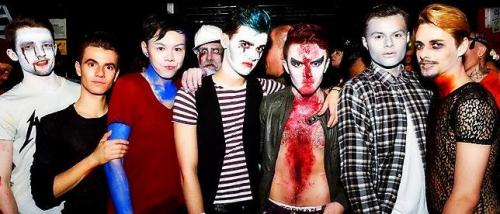|
Representation in Culture: Women
SO, as V recently took a step back with a view to having some new ideas crop up, I thought it might be fun to spark up some regular debates. For the time being I was thinking of looking at representations of different social groups within contemporary pop culture (music, film, art whatever)
Now, I thought I might as well start with women. No, this is hardly a new debate and yes, we in particular have had years of the "women in horror" discussions. Still, let's give it a go.
Of course - debate etiquette. By all means argue passionately but not personally. Keep it friendly, kids ;)
----------------------------------------------------------------------
I think my issue with this topic is that there is never and will never be a "solution". There is NO true, good, without-problem depiction of a woman possible in a film because the very nature of the art naturally leaves it open to interpretation.
Take Ripley, for example. Generally speaking she's thought of as a pretty good, unharmful, should-be-more-like-this woman of film. She begins the film with moderate power and is shown to be more intelligent than her superiors, and by no means passive. She survives to the end using her ingenuity and lives on to kick more ass in the future. So great, she's a wonderful woman of film! No damsel in distress, doesn't depend on a man, doesn't back down from arguments.
BUT, there is the counter argument that she is only powerful because she is masculinised. The qualities that ultimately save her and stop her from being subjugated are those typically associated with men. Even her clothes and make-up lack the typical (hate to use that word but can't think of a better one) femininity. Hell, the character WAS a man in the script! Just replacing the "him" with "her"s in the script doesn't make her a good woman, it makes her a man played by a woman...doesn't it?
This is my issue. The problem isn't that women supposedly only have power when they are made to be like men, the problem is that we as a culture have an image of a "standard man" and we can't get past it. Besides the physical aspects, we have this notion that qualities of sternness, emotional strength, willingness to fight etc. are "manly" qualities rather than just qualities that a person could have.
Granted, this IS how men have been portrayed in culture for years, but maybe if we just stopped talking about it as an aspect of being "male", we'd no longer think of it that way.
THEN there's the tin of worms Miley has opened. Is she objectifying herself, prostituting her body to appease the male fantasy in order to be loved and have worth - is she GIVING herself to men OR is she using her body to gain power over them? Who has the power?
In all honesty, I don't know. I just don't. I will not for a second deny that there isn't an awful lot of inherent sexism in our culture today and of course, there are the historical aspects of it - things that have stuck within the discourses of film. But equally I think a lot of the issue is that we keep on talking about it, poking holes and tearing apart any female figure for all of the "bad" ways she is depicting women. Is it always about gender? Could we equally not read Miley Cyrus' new persona as a harrowing idea of Americans or youths or all of the other social categories she fits into? Aren't people sometimes just people?
And only now do I realise the irony of my argument: "We all need to stop talking about sexism so much...so let's talk about sexism."
__________________

The Ferrets like it...
|